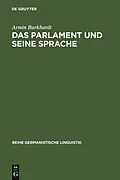Starting with an analysis of constitutive and pioneering sessions in central German parliaments since 1848, the study demonstrates how plenary debates have become more and more strongly ritualized and are progressively deteriorating into media events. Major chapters of the book are devoted to the linguistic description of political language and communication, the structural changes undergone by parliamentary publicity, the semiotics of plenary halls, and specific aspects of parliamentary communication. Additionally, the Wende debate (1982) serves as a demonstration of the most important phenomena of parliamentary language: catchwords, key terms, evaluative expressions, metaphor, allusions, the play on proper names, rhetorical figures, presuppositions, forms of address, the 'inclusive we', quotations. Following a comparative analysis of the 'identity' debate in the Church of St. Paul (1848) and the 'capital' debate in the German Bundestag, an extensive final chapter discusses the history, the practicalities, and the reliability of stenographic reports.
